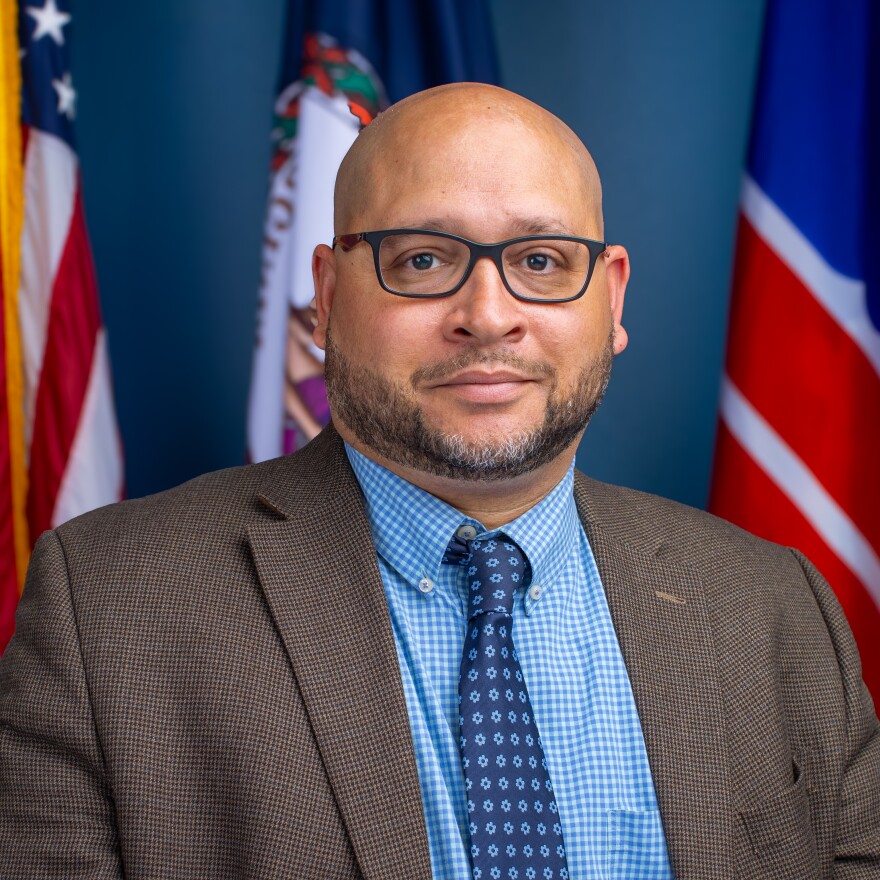The budget legislation that President Donald Trump signed into law on July 4th cuts federal health spending by around $1 trillion over the next decade, as NPR previously reported. WMRA's Randi B. Hagi brings us the first of a two-part report about how local hospitals are bracing for the funding challenges ahead.
The so-called "One Big Beautiful Bill Act" cuts federal healthcare spending in several ways. Two of the most consequential changes are Medicaid work and reporting requirements, and a decrease in the "provider taxes" that hospitals pay to access federal Medicaid money. While the effects of these and other policy changes are slated to play out over several years, administrators from Augusta Health and Valley Health told me they're already planning for serious funding cuts.
MARY MANNIX: We have a lot of hard decisions and a lot of heavy lifting in front of us.
TRAVIS CLARK: … about $50 million per year we could potentially not have reimbursement for.
As NPR reported, the largest cuts come from new requirements for Medicaid patients, which are expected to result in the disenrollment of millions of people by 2034. In states that have expanded Medicaid coverage under the Affordable Care Act to include low-income, childless adults, those of working age will have to regularly file paperwork proving they work, volunteer, or attend school at least 80 hours a month, or meet exemption requirements such as caring for a young child. People who've purchased a Marketplace healthcare plan under the ACA will also have more stringent annual reporting requirements.
The Congressional Joint Economic Committee Minority estimates that more than 300,000 Virginians will lose health insurance due to these cuts. Based on enrollment numbers, that breaks down to 35% of Virginians on an ACA Marketplace plan, and 11% of Virginians on Medicaid.

MANNIX: 2027 is when the work requirements and the redeterminations in Medicaid-expanded states will be implemented.
Mary Mannix is the CEO of Augusta Health, a nonprofit community health system with a hospital in Fishersville and community clinics in surrounding counties. Approximately 13% of their patients are insured by Medicaid.
Full disclosure, Augusta Health underwrites programming on WMRA.
MANNIX: That will be the beginning of patients that will begin to roll off Medicaid for their insurance plan, and also their eligibility for the Marketplace. We expect that what will happen in that circumstance is that patients … will no longer be seeking what we call 'upstream care,' so their primary care, management of chronic diseases. … Those individuals will eventually get sick, and if they have chronic diseases, they'll experience exacerbations. They might not be able to afford their medications. And what we expect is that, as those patients deteriorate, they'll show up in our emergency department, and we'll begin to see more congestion in our emergency department with these individuals seeking care.
Besides that being a crisis situation for the patient, it's also not good for the hospital. Under federal law, most hospitals that provide emergency services have to screen and stabilize patients that show up at their door – regardless of someone's ability to pay. So someone who's lost Medicaid coverage and goes to the emergency room is likely to require "uncompensated care" – services the hospital doesn't get paid for.

JULIAN WALKER: When there is more uncompensated care in the system … the cost of that care is initially absorbed by the provider, but it is ultimately borne by everyone who is connected to the system.
Julian Walker is the vice president of communications for the Virginia Hospital and Healthcare Association, which represents 26 health systems in the commonwealth.
WALKER: The cost of that uncompensated care ultimately gets factored into the rates that businesses have to pay for health insurance coverage for their employees, and the cost that employees incur in terms of deductions or withdrawals from their checks for premium amounts, or in terms of things like out-of-pocket costs such as deductibles, co-pays, and so on.
Valley Health is a not-for-profit health system based in Winchester that has hospitals, clinics and urgent care centers in Virginia and West Virginia. Travis Clark is the vice president of operations for the Shenandoah and Page Memorial Hospitals. These are both designated as "critical access hospitals," based on how far they are from the next closest hospital – or how difficult it is to get there over mountainous terrain.

Clark said 20% of the entire health system's patients are on Medicaid, and that number is similar for the two hospitals he oversees. Based on their analysis of the federal funding cuts, he said Valley Health stands to lose $50 million a year in uncompensated care.
TRAVIS CLARK: We definitely will need to get creative, redesign, change the way we deliver care. … Those folks, 19 to 64 without disabilities, they'll have to work 80 hours or volunteer 80 hours to remain on Medicaid, and then re-verify every six months or so. … I guess it's safe to say that if they had other opportunities or choices, they may have already been on that, so it could be their last avenue for coverage.
MANNIX: These are really good people. These are very hardworking people. These are the 'working poor,' if you will. There's been a lot of political rhetoric and stereotypes about this population of people. We are not seeing that. That's not been Augusta Health's experience. … These are people like you and me that are working really hard to make their life better and that of their children.
In part two of this report, we'll explore how the new budget bill changes how much hospitals can get paid for treating people who remain covered under Medicaid.
Editor's note, 5:38 p.m. — a previous version of this story contained out of date information about Valley Health's clinic locations. It has been corrected.


